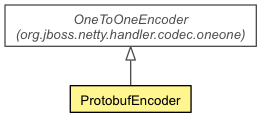
- java.lang.Object
-
- org.jboss.netty.handler.codec.oneone.OneToOneEncoder
-
- org.jboss.netty.handler.codec.protobuf.ProtobufEncoder
-
- All Implemented Interfaces:
- ChannelDownstreamHandler, ChannelHandler
@ChannelHandler.Sharable public class ProtobufEncoder extends OneToOneEncoder
Encodes the requested Google Protocol BuffersMessageandMessageLiteinto aChannelBuffer. A typical setup for TCP/IP would be:
and then you can use aChannelPipelinepipeline = ...; // Decoders pipeline.addLast("frameDecoder", newLengthFieldBasedFrameDecoder(1048576, 0, 4, 0, 4)); pipeline.addLast("protobufDecoder", newProtobufDecoder(MyMessage.getDefaultInstance())); // Encoder pipeline.addLast("frameEncoder", newLengthFieldPrepender(4)); pipeline.addLast("protobufEncoder", newProtobufEncoder());MyMessageinstead of aChannelBufferas a message:void messageReceived(
ChannelHandlerContextctx,MessageEvente) { MyMessage req = (MyMessage) e.getMessage(); MyMessage res = MyMessage.newBuilder().setText( "Did you say '" + req.getText() + "'?").build(); ch.write(res); }
-
-
Nested Class Summary
-
Nested classes/interfaces inherited from interface org.jboss.netty.channel.ChannelHandler
ChannelHandler.Sharable
-
-
Constructor Summary
Constructors Constructor and Description ProtobufEncoder()
-
Method Summary
Methods Modifier and Type Method and Description protected Objectencode(ChannelHandlerContext ctx, Channel channel, Object msg)Transforms the specified message into another message and return the transformed message.-
Methods inherited from class org.jboss.netty.handler.codec.oneone.OneToOneEncoder
doEncode, handleDownstream
-
-
-
-
Method Detail
-
encode
protected Object encode(ChannelHandlerContext ctx, Channel channel, Object msg) throws Exception
Description copied from class:OneToOneEncoderTransforms the specified message into another message and return the transformed message. Note that you can not returnnull, unlike you can inOneToOneDecoder.decode(ChannelHandlerContext, Channel, Object); you must return something, at leastChannelBuffers.EMPTY_BUFFER.- Specified by:
encodein classOneToOneEncoder- Throws:
Exception
-
-